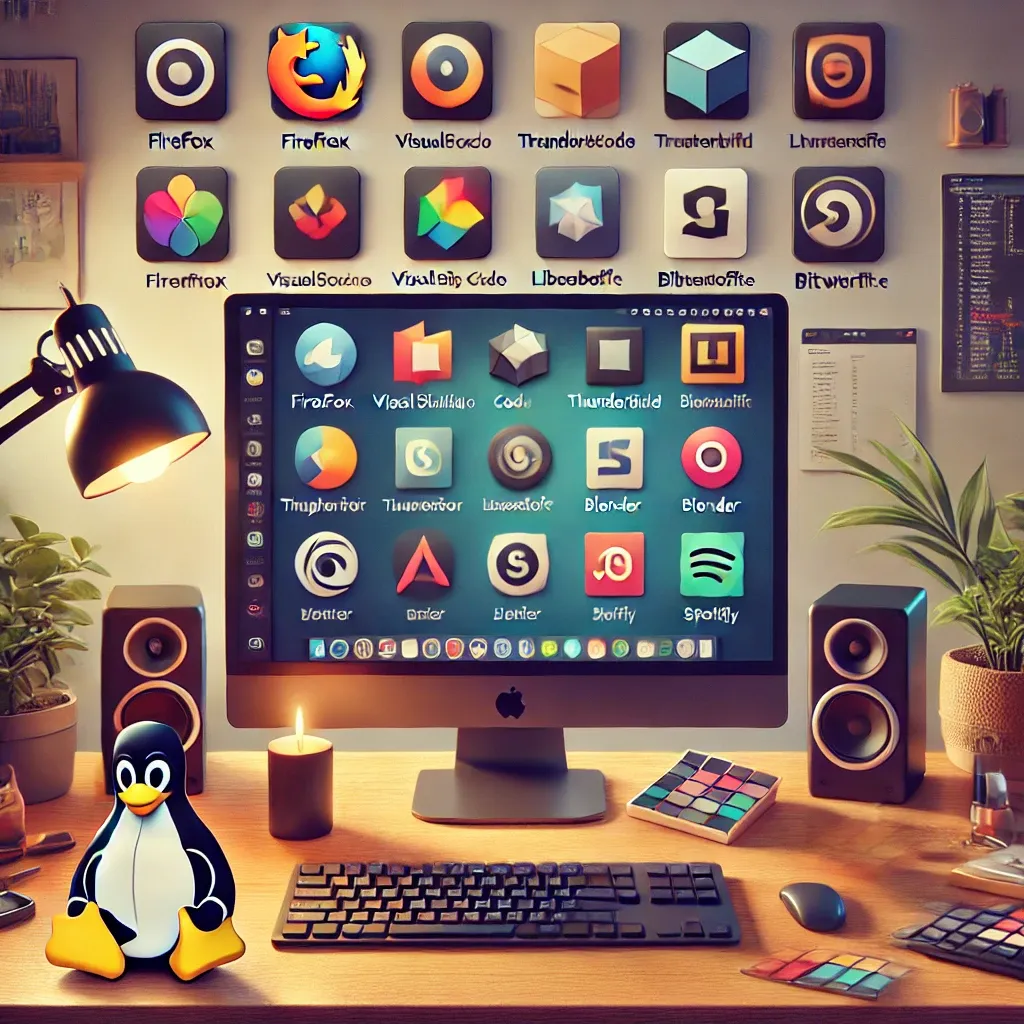My Essential Linux Apps: A Personal Toolkit for Productivity, Creativity, and Fun

Linux offers a flexible, customizable environment that’s perfect for building a personal suite of applications tailored to productivity, creativity, and even relaxation. Here’s a look at the key applications that make up my daily toolkit, helping me get things done efficiently while also fueling my creative projects.
1. Pika Backup
For peace of mind and data protection, I rely on Pika Backup. This user-friendly backup tool makes it simple to create secure, scheduled backups to external storage or cloud locations. It’s particularly useful for keeping important files safe without having to worry about complex setups.
2. Firefox
As a privacy-focused, open-source browser, Firefox is my go-to for web browsing. With a range of extensions, it’s easy to optimize Firefox for everything from productivity to enhanced security. The browser’s balance of performance, customization, and privacy is perfect for the Linux experience.
3. Thunderbird
For handling email and calendar management, Thunderbird is a reliable choice. With support for multiple accounts and strong security features, it’s an excellent, open-source solution that integrates smoothly with Linux. It helps me stay organized and on top of communications without compromising on privacy.
4. Steam
For gaming, Steam makes Linux gaming possible and enjoyable. Thanks to Proton and Wine compatibility, many popular titles are now accessible on Linux, allowing me to unwind with some games after a productive day.
5. Bitwig Studio
A powerful DAW (Digital Audio Workstation), Bitwig Studio is essential for my audio production and music creation needs. The support for Linux and Bitwig’s forward-thinking features—like modular sound design—make it my favorite tool for creative audio projects.
6. Bitwarden
Security is essential, and Bitwarden helps me keep track of passwords and sensitive information. This open-source password manager works across all platforms and syncs seamlessly, ensuring my data stays protected and accessible.
7. Bisq
Privacy and financial autonomy are important to me, and Bisq is a decentralized cryptocurrency exchange that enables private Bitcoin trades without a central authority. For crypto transactions, Bisq is one of the best tools to ensure financial privacy and independence.
8. Visual Studio Code
VS Code is my main code editor for everything from quick script edits to full-on development projects. With extensive support for plugins, it’s easy to customize for various programming languages, development environments, and tasks.
9. Spotify
For music streaming, Spotify is my go-to. While not open source, its Linux client offers a smooth experience and access to a vast music library. Whether I’m coding, writing, or just relaxing, Spotify keeps the tunes going.
10. LocalSend
For transferring files across devices on my local network, LocalSend is fast and straightforward. It’s ideal for quickly moving files between computers without needing cloud services or external drives.
11. Draw.io
Draw.io is an excellent tool for creating diagrams, flowcharts, and process visuals. It’s handy for technical documentation and brainstorming, making it easier to communicate complex ideas visually.
12. Anytype
Anytype is a new addition to my productivity setup. This app combines note-taking, to-do lists, and project management in an open-source package. It’s perfect for organizing everything in one place, from tasks and projects to brainstorming sessions.
13. LibreOffice
For all my document, spreadsheet, and presentation needs, LibreOffice is the ultimate open-source suite. It’s compatible with various file formats, ensuring I can share and collaborate without any compatibility issues.
14. Telegram
Telegram is my preferred messaging app. It’s versatile, supports both personal and group chats, and offers a Linux client, making it perfect for communication with colleagues and friends alike.
15. Remmina
For remote access, Remmina is my go-to. This open-source remote desktop client supports various protocols, making it easy to access and troubleshoot different systems from a single application.
16. Balena Etcher
To create bootable USB drives quickly, Balena Etcher is my preferred tool. It’s simple to use and reliable, especially useful when I need to install or troubleshoot different Linux distributions on other machines.
17. VirtualBox
For running virtual machines, VirtualBox provides a powerful, flexible platform. It’s great for testing software or running different OS configurations without affecting my main system.
18. OBS Studio
When it comes to recording or streaming, OBS Studio is unparalleled in terms of customization and power. I use it for everything from tutorials to presentations, and it’s a fantastic open-source solution for high-quality video production.
19. Blender
For 3D modeling and animation, Blender is my top choice. Whether it’s creating visual content, experimenting with animation, or simply exploring my creative side, Blender’s capabilities as an open-source powerhouse make it essential in my toolkit.
Conclusion
These applications form the backbone of my daily workflow on Linux, providing the tools I need for productivity, creativity, and relaxation. Each app is chosen not only for its functionality but also for its alignment with the Linux ethos of openness and community-driven development. Whether you’re new to Linux or looking for fresh ideas, I hope this list inspires you to explore the potential of a Linux-based setup tailored to your own needs.